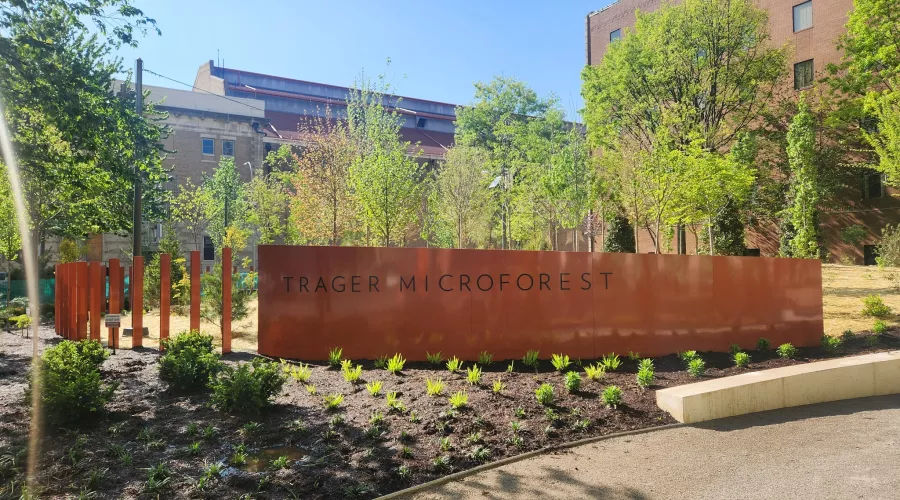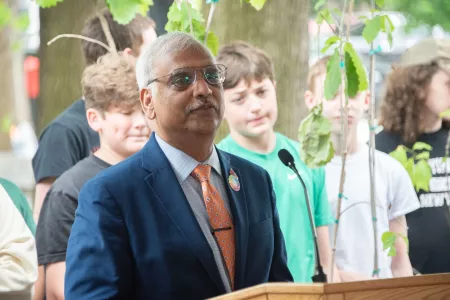Trager MicroForest at Founders Square opens to the public
May 13, 2025
A revamped and upgraded green space is taking shape in the heart of downtown Louisville. The Trager MicroForest, a research project of the University of Louisville’s Christina Lee Brown Envirome Institute, officially opens to the public on May 13.
After more than two years of baseline research, construction and planting, the 0.65-acre Founders Square, located at Fifth Street and Muhammad Ali Boulevard, is now an inviting public space for everyone to enjoy. However, the Trager MicroForest is more than a refreshed urban park. It is a space for scientific inquiry into the impact of intense urban greening on human health and the wider urban environment.
“The vitality of downtown Louisville is inextricably linked to the vitality of the University of Louisville and the entire metropolitan community,” said UofL President Gerry Bradley. “This beautifully renewed green space will benefit not only residents and visitors to the downtown area, it also will serve as a research site for groundbreaking investigations into the connection between trees and health by UofL researchers.”
A 30-year lease with Louisville Metro Government allows the Envirome Institute to use Founders Square as an outdoor public laboratory. In the park, UofL researchers test the physiological effects of dense planting on human health and to what extent the forest affects temperature and humidity in the area. For Phase One of the project, the central area of the park has been densely planted with trees, shrubs and ground cover to optimize cooling and reduce urban heat.
The Trager MicroForest Project builds on the Envirome Institute’s groundbreaking Green Heart Project, which found that adding trees to a neighborhood lowered residents’ inflammation levels.
Prior to planting and construction, UofL researchers collected baseline data on how spending time in the space affects stress levels and physiological responses compared with spending time in nearby downtown areas that lack greening. In addition to human studies, the researchers are monitoring air and surface temperatures, air quality and other measures to assess the impact of densely planted trees on the environment in and around the park.
“The Trager MicroForest is part of the wider mission of the Envirome Institute to pursue knowledge about health,” said Aruni Bhatnagar, director of the Christina Lee Brown Institute. “This little forest will not only provide a pleasant space to spend time in downtown Louisville, but it will also help us test how dense urban planting can improve human health. The results of this experiment could inspire and inform the planting of microforests in cities worldwide.”
The microforest is considered part of UofL’s New Vision of Health Campus, located just across Fifth Street, which will include specially designed laboratory space to study sleep, nutrition and exercise, as well as offices and public spaces to investigate how environmental factors impact human health. The development of this innovative campus affirms UofL’s commitment to the vitality of Louisville’s urban core.
"We are excited for this project and hope to see further growth in the greening of downtown Louisville,” Michael Trager-Kusman said. “We believe having public spaces like these will only contribute to the growth of downtown Louisville."
The park’s opening marks the completion of Phase One of the project. Planning and design for Phase Two of the Trager MicroForest will begin in late 2025. Learn more about supporting the project.
Watch the press conference of the official opening on May 13, 2025. View the photo gallery.
Related News





